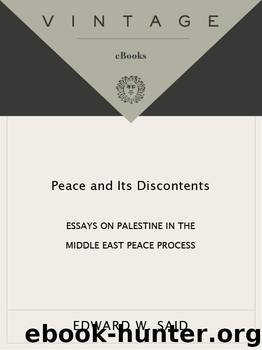Peace and Its Discontents by Edward W. Said

Author:Edward W. Said [Said, Edward W.]
Language: eng
Format: epub
ISBN: 978-0-307-82961-0
Publisher: Knopf Doubleday Publishing Group
Published: 2012-10-24T04:00:00+00:00
12
The American “Peace Process”
(August 1994)
American foreign policy under Bill Clinton is in a confused state, even for an administration that has wavered, advanced, and retreated innumerable times on domestic issues. Secretary of State Warren Christopher is certainly one of the weakest members of Clinton’s government; rumors that he will be fired for his lackluster performance have been circulating for at least a year; the appointment of Strobe Talbott, one of Clinton’s oldest friends, to the number two position at State some months ago was therefore widely interpreted as undercutting Christopher’s present tenure. Indeed it is difficult to think of Christopher in connection with any policy at all. He travels a fair amount and makes announcements from time to time, but he has no perceivable idea about anything, and no capacity it seems to formulate his government’s position in either a firm or (at least) a memorable way. At best he dresses elegantly. Anthony Lake, the President’s national security adviser, is an amiable former academic, who is even less visible than Christopher and just as effective. He too has been the target of reports saying that he will be replaced.
But the fact is that Clinton himself seems as though he does not much care for foreign affairs and has no inclination or gift for articulating and maintaining an American globalism. From the agonies of Bosnia, to the early disgraceful wavering on Haiti, to China, Russia, North Korea, Iraq, Japan, Chechnya, Turkey, Rwanda, Somalia, and elsewhere, Clinton has demonstrated an almost total incapacity for vision and concentration. Not that he does not have enough policy planners and intellectuals around him in Washington and elsewhere clamoring for his attention, and urging smart new theories on the post–Cold-War world. One such candidate has been Professor Samuel Huntington of Harvard, who a year ago argued in Foreign Affairs that the new world order would be determined by “a clash of civilizations,” in which Islam, Western liberal democracy, and Confucianism among others were going to battle each other for supremacy. Huntington’s thesis was designed to replace the old U.S.–USSR clash with a new one, but although the argument itself has been much debated all over the country it seems to have had no effect at all on Clinton and his people.
This apparent stagnation, however, does not make the United States any less an imperial power, running not on personalities and ideas, but on institutions and the traditions of a long history of intervention. The military budget is still larger than the combined military budgets of every other country. Nothing can be done (or undone) in the United Nations without the United States and, to make matters more obvious, few governments or groups in Europe, Asia, Africa, Latin America, and Australia do very much in foreign policy that does not give the United States a central role to play. Reduced though it is (it will be even more), the American foreign-aid package is remarkably potent, with various foreign lobbies in Washington actively competing with each other for larger portions of the annual Congressional allocation.
Download
This site does not store any files on its server. We only index and link to content provided by other sites. Please contact the content providers to delete copyright contents if any and email us, we'll remove relevant links or contents immediately.
| Africa | Americas |
| Arctic & Antarctica | Asia |
| Australia & Oceania | Europe |
| Middle East | Russia |
| United States | World |
| Ancient Civilizations | Military |
| Historical Study & Educational Resources |
Empire of the Sikhs by Patwant Singh(23079)
The Wind in My Hair by Masih Alinejad(5093)
Rise and Kill First by Ronen Bergman(4784)
The Templars by Dan Jones(4686)
The Rape of Nanking by Iris Chang(4209)
12 Strong by Doug Stanton(3544)
Blood and Sand by Alex Von Tunzelmann(3201)
Babylon's Ark by Lawrence Anthony(2674)
The History of Jihad: From Muhammad to ISIS by Spencer Robert(2623)
No Room for Small Dreams by Shimon Peres(2367)
The Turkish Psychedelic Explosion by Daniel Spicer(2355)
Inside the Middle East by Avi Melamed(2353)
Gideon's Spies: The Secret History of the Mossad by Gordon Thomas(2347)
Arabs by Eugene Rogan(2295)
The First Muslim The Story of Muhammad by Lesley Hazleton(2268)
Come, Tell Me How You Live by Mallowan Agatha Christie(2258)
Bus on Jaffa Road by Mike Kelly(2154)
Kabul 1841-42: Battle Story by Edmund Yorke(2026)
1453 by Roger Crowley(2024)
